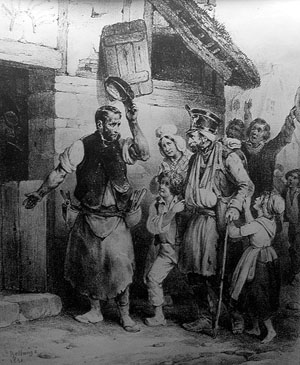3. Polish emigrants 1830
 Click image to enlarge
Click image to enlarge
Questions
Description and Analysis
The answers for the “Open Questions”:
- Polish refugees are welcome with joy in the presented picture. The door to the cottage is wide open. The host who welcomes the newcomers, is smiling, takes off his hat in a gesture of respect. Characters in the background do the same. Children running around hold a wounded insurgent.
- The French like the Belgians sympathized with the Poles and their struggle, because of their own aspirations to freedom and civil equality. The November Uprising also protected the fighting Belgians from the interference of Russian troops.
- The French government, under pressure from the public and international opinion, not only allowed the Poles to settle in their country, but also granted financial allowances to emigrants, as mentioned in the article from the first content page.
Geographical/Historical Context
The fight of the Poles for independence in the nineteenth century was only one of the movements that aimed at overthrowing the social relations based on the inequalities resulting from the social background. The other goal of these movements was to release smaller nations (but aware of their historical and cultural differences) from enslavement by the powerful conservative monarchies (the Habsburgs, the Hohenzollerns, and the Romanovs). As a result the escalation of increasing conflicts took place in 1830, when first the French followed by the Belgians and the Poles stood up to fight for civil rights and freedom of nation.
In France, actions of Charles X of France who aimed at restoring the socio-political relations from before the French Revolution (absolute government based on the aristocracy and Catholic clergy) led to the armed rising in Paris in July 1830. The bourgeoisie supported the July Revolution (1830) to defend their rights acquired during the Napoleonic era. The opposition to the government aspirations to restrict freedom of speech and the right of assembly aroused among the petite bourgeoisie and the intelligentsia. Fight of these two social groups concerned democratic civil rights. The so-called "Three Glorious Days” (July 27-29 1830) concluded with abdication of Charles X of France accession to the throne by "King of the French" - Louis Philippe I who had limited prerogatives, and fully respected the privileged position of the bourgeoisie in the country.
In the United Kingdom of the Netherlands (which from 1815 was a common state for Belgians and the Dutch), Belgians stood up to fight for emancipation and to overthrow of the regime of king William I (Wilhelm I) after the news about the victory of the French against the conservative monarchy. During a few weeks of August and September 1830, they managed to repel an armed intervention of the royal army. In October of the same year, Belgians declared independence. Leopold I of the House of Saxe-Coburg and Gotha came to the throne.
William I, who was expelled from Belgium, asked the rulers of Austria, Prussia and Russia, as signatories of the Holy Alliance, for assistance. But only tsar Nicholas I began preparations for a armed intervention. The lack of support for William I directly contributed to the decision to accelerate the uprising in Poland. Thus, within the modern understanding, the Poles saved the Belgian revolt from attacks by Russian troops and the restoration of the government of William.
All these facts were the fundament of the popularity that participants of November Uprising gained in the eyes of European public opinion. Unequal but heroic struggle gave insurgents growing admiration and respect of societies across the continent. And the defeated insurgents that were forced to emigrate from the country, were greeted enthusiastically in Germany, Belgium, and France. Governments of these countries looked at this issue totally differently. For them, the Poles were often simply political troublemakers who were spreading dangerous (because democratic) rebellious ideas against the order established by the Congress of Vienna. However, public pressure often forced the authorities to accept the Polish immigrants, and in special cases (such as in France) to grant them allowances.
The positive legend associated with the insurgents of November Uprising began to fade with time. Next waves of immigrants (e.g. in 1863) did not draw special interest in Europe.
Links
http://www.poland.gov.pl/Polacy,na,emigracji,77.html – websides devoted to the history of Polish people in 19th century on the official promotion portal of the Republic of Poland
http://encyklopedia.pwn.pl/haslo.php?id=3959692 - enczklopedzcyne presenting the history and the arrangement of the Polish community around the world




Presentation
The drawing of an unknown author presents the greeting (most probably in France) of participants of November Uprising running away from the former Polish lands who were persecuted by the Russian state. The November Uprising was, at that time, one of several uprisings of European nations fighting for the ideals of freedom, equality, and civil right. At the same time, the Belgians officially opposed their authorities. A few months earlier, as a result of the revolution, the French led to the abdication of their King. Although the objectives of the militants in the various countries were different, the idea of the fight remained the same. It was aimed to build the sense of solidarity and community among the revolutionaries from different nations.
The terms that you should understand:
Right of asylum (or political asylum) – protection given by a country to foreigner who is a fugitive or who is oppressed on political, racial, etc. grounds by another country.
Abdication – act of renouncing powers and rights to the throne by a ruler.
Dethronement (deposition) – act of depriving a ruler (monarch) of power and rights to the throne, for example, by the revolting people of the same state.